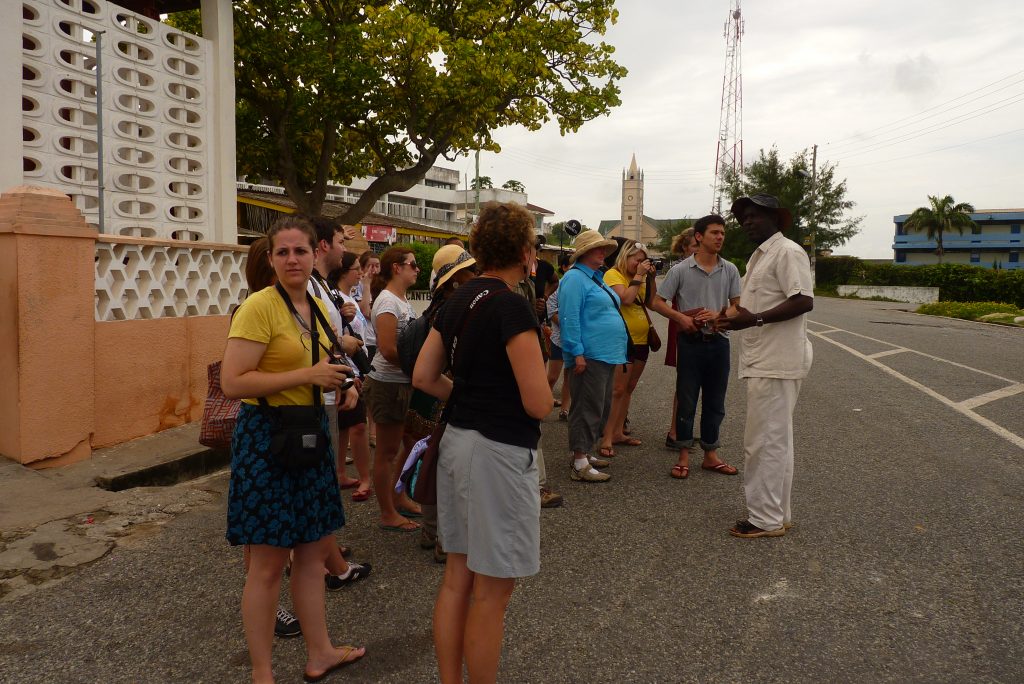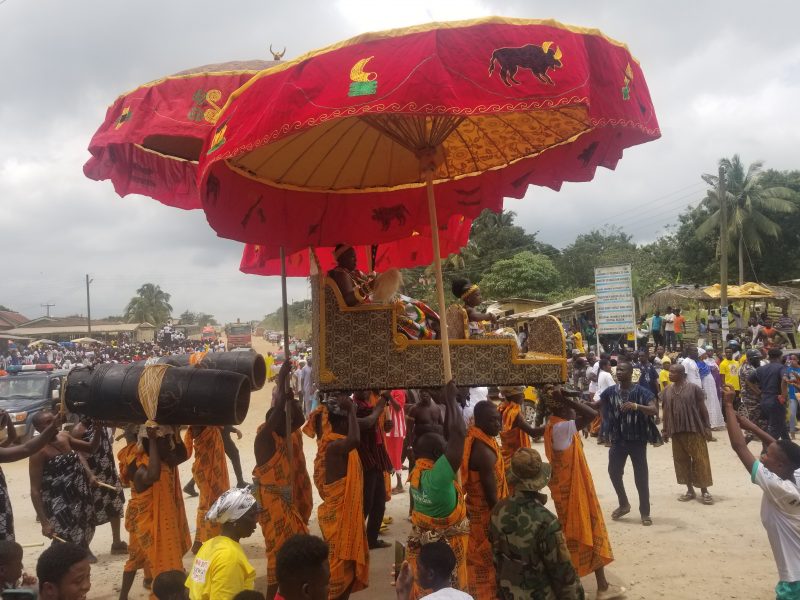Guided Walking Tours
Embark on an unforgettable adventure and experience the soul of Ghana by taking a guided walking tour of historical and cultural significant towns. Step off the beaten track and get into the heart of vibrant cities, ancient villages, historic towns and breathtaking natural landscapes. Led by experienced and passionate local guides, these walking tours offer an intimate and immersive way to discover Ghana’s diverse cultures, traditions, and history. Meander through bustling markets, where the vibrant colors and lively sounds will awaken your senses. Explore communities different from yours and historical landmarks that have contributed to shaping our history, as well as lesser-known trails that wind through shrines, markets, cemeteries and picturesque countryside. Engage with warm and welcoming locals, gaining insights into their daily lives and timeless customs of Ghanaians. Explore the lively streets of Accra, stroll along the palm-fringed beaches of Cape Coast, trek through the stunning fishing communities of Elmina or Sekondi and help the fishermen pull in the day’s catch of fish, learn how to tie a baby at your back or exhibit your body balance by attempting to carry a load on your head without holding it. Guided Walking Tours in Ghana provide a truly authentic and enriching experience that will leave you with lasting memories of this captivating West African nation.
Structured guided tours are provided to interpret significant historical and cultural landmarks. Structured guided tour are offered in the following towns:
- Cape Coast: driving or walking around Cape Coast, the town offers a broad spectrum of colonial and modern architecture and commercial setting. A drive or walk through Cape Coast reveals that the churches, schools, and commercial and domestic houses with their Victorian architecture bear resemblance of its colonial heritage. Unearth the beginnings of Christian missionary work in church building, as well as important open spaces. Learn about some major heritage buildings and sites, sacred places with deep religious and cultural significance. A walk through the alleys will lead you to understand the beginnings of Christian missionary work in Christianity and church building in West Africa. The road to Fort William may be unkempt, but a visit to the top of the fort gives a bird’s eye view of the architecture of Cape Coast. This is where binoculars and a camera in hand become more useful and priceless devices.
Discover the magnificent monumental civic buildings, homes of some illustrious Ghanaians and learn about their pioneering roles that prepared the grounds for our independence from the British colonialists. Walk down Jerusalem Street to London Bridge, Beulah Lane and take note of such street names as Coronation Street, King Street, George Street, Victoria Park, Jackson Street, Jerusalem Street also remember place names such Ntoto, Anaafo, Ntsin Brofoyedur and areas such as; Amanful, Ntsin and the Fishing Port, fish processing and fishing gear mending, the Commercial Street to Kotokuraba Market and bargain to buy a piece of cloth, slip-on, hardware or many of the imported items on display.
Elmina town walk;
- Elmina is a small community and easy to walk around. Being the first European city in Africa Elmina has a lot to share than what meets the eye. The town walk offers in-depth information on the economic, historical, and cultural activities of Elmina. Beyond the Elmina Castle is a lively community full of history and tradition. Learn about the archaeological site of the old Elmina township that was destroyed by the British and the 19th Century Dutch Merchant Houses, The tour takes patrons to the Dutch Cemetery with its imposing Mausoleum and grave markers which recount the stories of European and African celebrities, canons of redoubts which fortified the town from external attacks, walk by the “Asafo posuban” traditional military posts and learn about the philosophies behind these Asafo company effigies
- A walk in the fish market reveals the different variety of seafood available to the local population, experience the life of fisher folk. Trace the Dutch Walk to enjoy a history of the Dutch and other Europeans in Elmina, and learn how a Saint of the Roman Catholic Church metamorphosed into a god in Elmina. Also learn about the indigenous population, their occupation, religious and social life.
- Listen to stories about prominent families and personalities like Vanderpuije, Van Ess, Vandyke, Bartels and Vroom. Photograph edifices built by wealthy Dutch and Afro-Dutch merchants, let us re-enact how the Dutch took over the castle from the Portuguese. marble stone that marked the spot, visit the ruins of Mount Pleasant with its black and white marble tiled stairs, the Government Garden; see partly- ruined neo-classical gates to the Garden, the Watch tower which protected and connected the Garden with all the towers in Elmina, the Java Hill and cannons that protected the redoubts and the town. The tour will brief you about the Dutch cemetery in which many nuns and Roman Catholic Fathers are buried. Also visit the site of Schomerus Hill and Fort Coenraadsburg.
Sekondi-Takoradi is a city in Ghana Western Region. Discover things to do in Sekondi-Takoradi, activities, detailed information.
- Sekondi European town, Fort Orange and fishing harbor: Explore the twin-city of Sekondi – Takoradi, the capital of the Western Region; tour the Bisa Abrewa” Museum and see a wide collection of artifacts depicting the greatness of Africa and people of African descent and other African who have excelled in the professional endeavors. Visit the Sekondi fish market; discover natural harbours with colorful boats, see local fish processing methods and sites, interact with fisher folks and learn about their daily lives.
Visit the Albert Bosomtwi Sam Fishing Harbour and Fish Market and interact with the fish mongers, learn about their livelihoods. Photograph colourful boats and flags, fishes like barracuda, gruppa, tuna, red snapper, shark, sole, blue ray, butter fish, salmon and many others are brought in daily by the fishermen. Learn at first hand local fish processing methods; salting and sun-drying, freezing, frying, and smoking. The fishing industry is the back-bone of the local economy; it employs about two-thirds of the local population.
Continue to Fort Orange built by the Dutch in 1642 for the Trans –Atlantic Slave Trade now a Lighthouse and enjoy a breeze and a panoramic view of the Atlantic Ocean and the Naval Base. NO PHOGRAPHY PLEASE from the Fort.
- Takoradi Market Circle After lunch drive through Takoradi and visit the Market Circle and other markets; familiarize with a variety of farm produce and interact with the women.
- Accra City tours includes Jamestown, Independence Arch, Osu – Christiansburg, Legon, Du Bois Centre, Padmore Library,
- Mankessim market
- Anomabo Posuban and Heritage route
Notes on walking/bus tours
- Availability: All days, year round
- Cost per participant: $10 or Ghana cedi equivalent. (Group discount applies)
- Fish Markets Walk NOT available on Tuesdays
- Walking Tours are scheduled 24-hours subject to availability
-Time/Schedule: tours can be scheduled for anytime of the day
- Booking should be made at least 24 hours ahead of time
- Meeting point: tours normally starts from the Castle Square, but it can be scheduled to start from anywhere in town at the convenience of guide and patrons.
- What to bring: always check the weather as a tropical country, the weather can be cold or warm in both extremes. Light and casual dress, flat footed shoes or slip-ons, sunshade, hat/ cap, standby with an umbrella or raincoat during the months of June-August, bottled water and some snack. It is also good to bring, if possible, school items such as pens and pencils or handy toys for children who will readily pose for a picture with you.
- Tips on photography: local people don’t approve of taking photographs of them without their approval or consent. However, some scenarios, actions and situations such as public ceremonies, festivals and durbars do not require permission. In some situations, request for approval will obstruct or interfere with the action, hence lose the significance of the photo. Always ask your guide or be discreet when taking photographs. Do not take photographs of security installations or people in uniforms. It is against the law.
Book a tour with me






